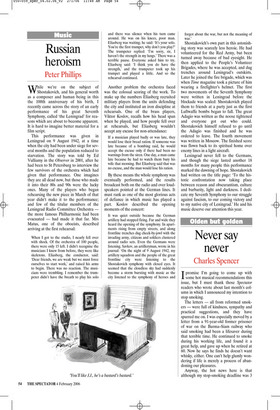Russian heroism
Peter Phillips
While we’re on the subject of Shostakovich, and his general worth as a composer and human being in this the 100th anniversary of his birth, I recently came across the story of an early performance of his great Seventh Symphony, called ‘the Leningrad’ for reasons which are about to become apparent. It is hard to imagine better material for a film script.
This performance was given in Leningrad on 9 August 1942, at a time when the city had been under siege for several months and the population reduced to starvation. The story was told by Ed Vulliamy in the Observer in 2001, after he had been to St Petersburg to interview the few survivors of the orchestra which had given that performance. One imagines they are all dead now, but those who made it into their 80s and 90s were the lucky ones. Many of the players who began rehearsing the new piece in March of that year didn’t make it to the performance; and few of the titular members of the Leningrad Radio Committee Orchestra the more famous Philharmonic had been evacuated — had made it that far. Mrs Matus, one of the oboeists, described arriving at the first rehearsal:
When I got to the studio, I nearly fell over with shock. Of the orchestra of 100 people, there were only 15 left. I didn’t recognise the musicians I knew from before, they were like skeletons. Eliasberg, the conductor, said: ‘Dear friends, we are weak but we must force ourselves to start work,’ and raised his arms to begin. There was no reaction. The musicians were trembling. I remember the trumpeter didn’t have the breath to play his solo and there was silence when his turn came around. He was on his knees, poor man. Eliasberg was waiting; he said: ‘It’s your solo. You’re the first trumpet, why don’t you play?’ The trumpeter replied: ‘I’m sorry, sir, I haven’t the strength in my lungs.’ There was a terrible pause. Everyone asked him to try. Eliasberg said: ‘I think you do have the strength,’ and the trumpeter took up his trumpet and played a little. And so the rehearsal continued.
Another problem the orchestra faced was the colossal scoring of the work. To make up the numbers Eliasberg recruited military players from the units defending the city and instituted an iron discipline at rehearsals. One of the brass players, Viktor Koslov, recalls how his head span when he played, and how people fell over at rehearsals, but Eliasberg wouldn’t accept any excuse for non-attendance:
If a musician played badly or was late, they would lose their bread ration. If someone was late because of a bombing raid, he would accept the excuse only if there had been no warnings from the siren. One day, a man came late because he had to watch them bury his wife that morning. But Eliasberg said that was no excuse, and the man would lose his ration.
By these means the whole symphony was eventually performed, and the results broadcast both on the radio and over loudspeakers pointed at the German lines. It must rank as one of the most glorious acts of defiance in which music has played a part. Koslov described the opening moments of the concert:
It was quiet outside because the German artillery had stopped firing. Far and wide they heard the opening of the symphony. In apartments rising from empty streets, and along frontline trenches dug cheek-by-jowl with the invading army, citizens and soldiers clustered around radio sets. Even the Germans were listening. Savkov, an artilleryman, wrote in his journal: ‘On the night of 9 August 1942, my artillery squadron and the people of the great frontline city were listening to the Shostakovich symphony with closed eyes. It seemed that the cloudless sky had suddenly become a storm bursting with music as the city listened to the symphony of heroes and forgot about the war, but not the meaning of war.’
Shostakovich’s own part in this astonishing story was scarcely less heroic. He had volunteered for the Red Army, but been turned away because of bad eyesight. He then applied to the People’s Volunteer Brigades, where he was accepted, and dug trenches around Leningrad’s outskirts. Later he joined the fire brigade, which was when Time magazine took a picture of him wearing a firefighter’s helmet. The first two movements of the Seventh Symphony were written in Leningrad before the blockade was sealed: Shostakovich played them to friends at a party just as the first Luftwaffe bombs began to fall. The great Adagio was written as the noose tightened and everyone got out who could. Shostakovich himself refused to go until the Adagio was finished and he was ordered to leave. The fourth movement was written in Moscow. The finished score was flown back to its spiritual home over enemy lines in a light aircraft.
Leningrad never fell to the Germans, and though the siege lasted another 18 months for many people this performance marked the dawning of hope. Shostakovich had written on the title page: ‘To the historic confrontation now taking place between reason and obscurantism, culture and barbarity, light and darkness. I dedicate my Seventh Symphony to our struggle against fascism, to our coming victory and to my native city of Leningrad.’ He and his music deserve our attention this year.





























































































































 Previous page
Previous page